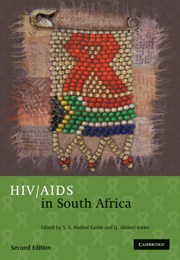Book contents
- Frontmatter
- Contents
- List of Contributors
- Foreword: Peter Piot
- Foreword: Nelson R Mandela
- Acknowledgements
- Section 1 Birth of a rapidly growing epidemic
- Section 2 The virus, the human host and their interactions
- Section 3 HIV risk factors and prevention strategiess
- Section 4 Focal groups for understanding the HIV epidemic
- Section 5 The impact of AIDS
- 21 Impact of AIDS – the health care burden
- 22 The impact of AIDS on the community
- 23 The impact on ethics
- 24 The economic impact of AIDS
- 25 AIDS-related mortality in South Africa
- 26 Picking up the pieces: the end of AIDS denialism and its aftermath
- Section 6 Treating HIV
- Section 7 What does the future hold?
- Index
23 - The impact on ethics
Published online by Cambridge University Press: 07 September 2011
- Frontmatter
- Contents
- List of Contributors
- Foreword: Peter Piot
- Foreword: Nelson R Mandela
- Acknowledgements
- Section 1 Birth of a rapidly growing epidemic
- Section 2 The virus, the human host and their interactions
- Section 3 HIV risk factors and prevention strategiess
- Section 4 Focal groups for understanding the HIV epidemic
- Section 5 The impact of AIDS
- 21 Impact of AIDS – the health care burden
- 22 The impact of AIDS on the community
- 23 The impact on ethics
- 24 The economic impact of AIDS
- 25 AIDS-related mortality in South Africa
- 26 Picking up the pieces: the end of AIDS denialism and its aftermath
- Section 6 Treating HIV
- Section 7 What does the future hold?
- Index
Summary
HIV CLINICAL TRIALS IN the developing world are fraught with ethical dilemmas. However, an approach that is responsive to the social, political, economic, and infrastructural milieu of the study population should be the realisable goal of researchers and sponsors, and not remain just a hypothetical construct. This should be so even if the preferred course of action of the host country does not seem to resonate with that of the sponsoring country. Study populations must be protected from exploitation.
The health care needs of a population must dictate the study design. However, the shortcomings implicit in overprotecting research participants in the developing world must also be recognised. Blindly presuming that a first world standard of health care is inherently the gold standard to be applied universally can ultimately compromise the interests of those it is intended to help. Besides such a stance being paternalistic, it can potentially hamstring research in these settings when the gold standard cannot be attained on logistic, financial, or physiological grounds. The grounding of research because of such factors would run counter to the interests of the intended study population.
Under normal circumstances clinical practice is a fertile ground for dual loyalty dilemmas. hiv/aids merely compounds that problem. While the recommendations suggested here are by no means exhaustive, definitive or even necessarily always universally applicable, in the absence of a better solution they can help health professionals resolve difficult ethical dilemmas.
- Type
- Chapter
- Information
- HIV/AIDS in South Africa , pp. 393 - 416Publisher: Cambridge University PressPrint publication year: 2010

